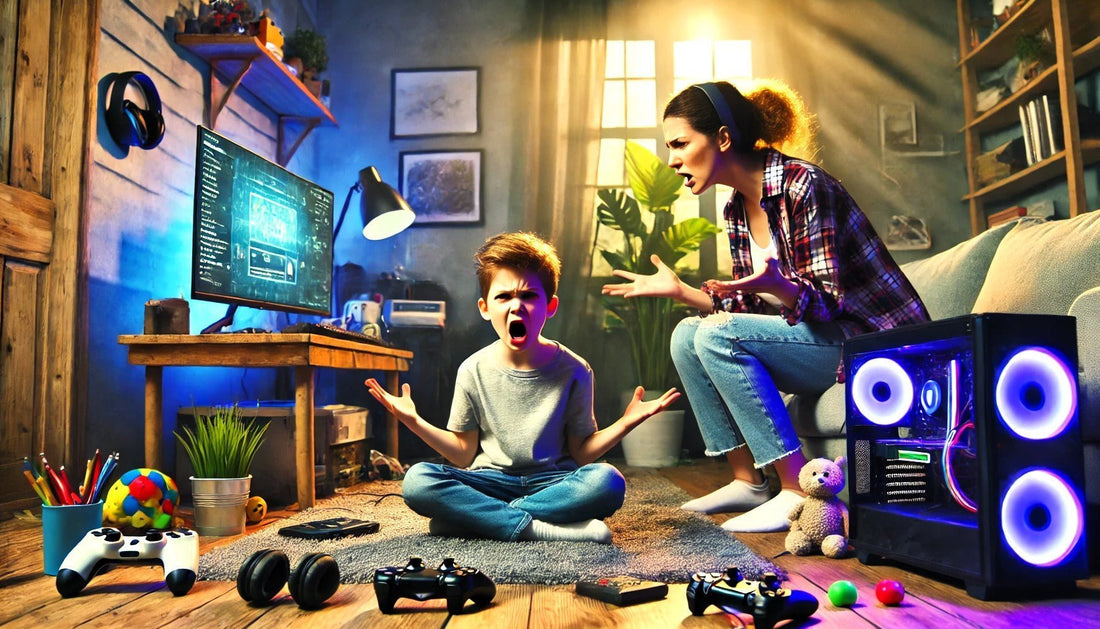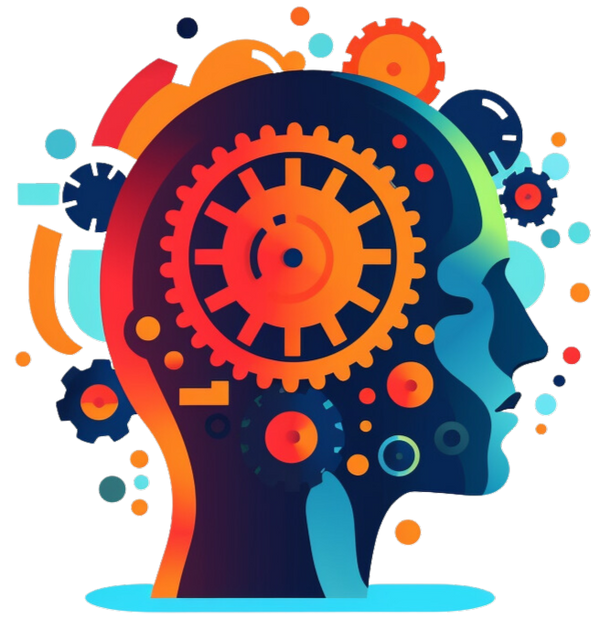
ADHD and gaming: digital helper or destructive villain?
Share
Video games offer children with ADHD a world of adventure, where they often feel more focused than in everyday life. But they pose a risk of gaming addiction. How can you, as a parent, find the balance for your child—and what should you keep in mind?
Video games are an integral part of many children's lives, especially those with ADHD. Parents are often faced with the question of whether gaming helps or harms their children. Video games offer many benefits as well as some serious risks —especially in terms of their addictive potential. In this article, we take a look at how gaming affects children with ADHD, which games can actually be beneficial—and what you as parents should keep in mind.

The fascination of gaming in ADHD
Children with ADHD tend to hyperfocus, an intense concentration on a specific task. This is precisely what makes video games so appealing. With rapid stimuli, colorful worlds, and immediate rewards, those with ADHD can often concentrate better on games than on schoolwork. They're so good at it, in fact, that those around them are surprised and often angrily ask why they lack concentration when it comes to homework . Surely this must be a sign of malice?
One thing is clear: Many games require tactical/strategic thinking, flexible problem-solving, and quick reactions. They therefore promote skills that strengthen ADHD children (or all children) and benefit them in life. And: These are typical hunter skills – which leads directly to an interesting biological/sociological ADHD theory . Studies have also shown that children who play 3D games develop a better sense of orientation in the real world. This is hardly surprising, given that the 3D worlds in modern games are designed with accurate perspective and feature photorealistic graphics.
But what at first glance appears to be only positive can also lead to nervous and social problems. The constant need for quick rewards reinforces impulsive behavior – even though ADHD children are naturally much more impulsive and often struggle with their mood swings (or even those around them, during tantrums).

At a glance: Advantages and disadvantages of gaming for ADHD
Benefits for children: Gaming is not only fun, but also provides an opportunity to learn important skills. For example, the game Portal is a puzzle platformer that promotes logical thinking and creativity, even in the "fourth dimension" (i.e., time). Players must solve physics-based puzzles to overcome obstacles. They cleverly open portals that they know lead to another room – and from there again.
The game is particularly useful for children with ADHD because it trains strategic thinking and problem-solving in a controlled yet challenging environment. A sense of achievement is immediate as soon as you advance to the next room. Patience is also required, however, because you have to somehow make it to the exit—and there are many dead ends.
The turn-based strategy game Civilization also offers an excellent platform for practicing patience and long-term planning. Players lead a civilization from ancient times to the modern era and learn to consider the far-reaching consequences of their decisions – a valuable skill for children who have difficulty controlling their impulsiveness. The action in the game is very manageable. It's not about quick button-mashing, but rather well-considered actions to expand one's territory and advance research for one's civilization – from the Stone Age to the Space Age.

Games like Rocket League , meanwhile, improve hand-eye coordination and encourage quick thinking. This game, in which cars play soccer, offers short, action-packed matches that are especially appealing to children with ADHD, as they can experience quick success and immediate rewards without having to spend hours immersed in a game.
Disadvantages for children: Unfortunately, there are also serious downsides to smartphone, tablet, and PC/video games. First, excessive gaming can lead children to neglect other commitments, such as studying. The lure of quick rewards, which are signaled to the brain by winning and progressing in the game, can be addictive – as addictive as drugs.
The result: academic performance deteriorates, social interactions in real life decrease, and the child may become isolated instead of maintaining friendships. Furthermore, many ADHD children tend to react very irritably when they are pulled away from play (hyperfocus!) – a sign that play behavior is taking an unhealthy turn.

Addictive potential: Why gaming can be dangerous
Children with ADHD, in particular, are at increased risk of spiraling into addiction. The reason for this lies deep in the brain: dopamine. This neurotransmitter plays a crucial role in controlling motivation, reward, and attention. In people with ADHD, the dopaminergic system doesn't function optimally – the brain produces too little dopamine or can't process it properly. This makes it harder to concentrate or stay motivated.
That is why stimulants such as Ritalin and amphetamine are used in ADHD therapy .
Video games are designed to provide constant, small rewards—whether by scoring points, unlocking new levels, or defeating opponents. Each of these successes triggers a release of dopamine in the brain, similar to Ritalin, but much faster (and therefore addictive). For an ADHD brain, which is already "hungry" for this reward, these dopamine bursts are especially tempting, even irresistible. The constant sense of achievement strengthens the connection to the game—and makes it difficult to stop.

A warning sign for parents should be if your child only talks about games, becomes increasingly angry when told to stop, or neglects other interests. In such cases, it's important to set clear boundaries and offer alternatives. Shared activities like sports or playing board games can help shift focus and reduce the need for dopamine.
Games that can even manage ADHD symptoms
However, not all games promote addictive behavior or lead to problems. Some games even offer benefits for children with ADHD. Those that challenge the brain while providing a calm environment are particularly suitable. Games like Stardew Valley or Animal Crossing allow you to immerse yourself in relaxing worlds.
In Stardew Valley, players build and maintain a dilapidated farm over time—a game that emphasizes long-term rewards and patience rather than instant gratification. Animal Crossing offers a similarly calming environment where children can develop creatively and practice social interactions in a controlled world.
Another notable game is EndeavorRx , specifically designed to reduce ADHD symptoms. It's the first FDA - approved therapeutic video game for ADHD. It uses targeted challenges to increase attention span—and exercise the brain through play.

Time management – the key to a healthy approach
Finding a balance between playtime and other activities is essential. Time management can be difficult for children with ADHD, but it's also essential to avoid negative effects. Parents can provide support by establishing clear rules, such as set playtimes and breaks. Using timer apps and visual timers that signal breaks after a certain amount of time can also be helpful.
It's important that gaming doesn't become the sole leisure activity. Sports activities or creative hobbies should still be encouraged. A good approach is to use gaming as a reward system for other activities (of course, not those that should be taken for granted). This way, gaming becomes an incentive, but not the focus of life.

Therapeutic use of gaming
Researchers are increasingly investigating gaming as a complementary therapy for ADHD. Studies show that certain games can improve working memory, increase concentration, and reduce stress levels. Virtual reality and augmented reality applications, in particular, offer great potential for achieving therapeutic goals through play. Such approaches are not new, as the brain often does not distinguish between real-life stimuli and those from the gaming world.
Years ago, for example, a VR game caused quite a stir by significantly reducing pain for children in hospitals. In the game, the young patients with third-degree burns moved around in virtual ice worlds – and thus felt less internal heat and pain from the burns.
Parents should therefore be open to new approaches – and, together with experts, explore the potentially even therapeutic potential of products like VR headsets. However, it remains important that gaming is consistently monitored and controlled to minimize negative effects.

CONCLUSION: Gaming is OK, even with ADHD – but look very carefully
Video games can have both advantages and disadvantages for children with ADHD. Because many games have a high potential for addiction, consistent limits are especially important. Children with ADHD have the potential to become true gaming masters, but they are also (medically proven) significantly more likely to become addicted.
With clear rules, a good balance between playtime and other activities, and the right selection of games, gaming can even be beneficial for cognitive development (training concentration, developing problem-solving skills, learning endurance, and 3D orientation). There are also many games that can be played by two (or up to four) players, either taking turns or even simultaneously. So why not invite REAL friends over to enjoy an afternoon of gaming together?
As parents, you should definitely make sure to set boundaries early on and express your "no"s as consistently as possible. Repeatedly and emphatically, if necessary. This may sometimes feel a bit like "fighting a final boss," especially since your ADHD child will also have a very STRONG WILL when it comes to this topic.
But hey: This isn't a lose-win situation. If you approach gaming in a controlled manner, you as a whole family will win.
